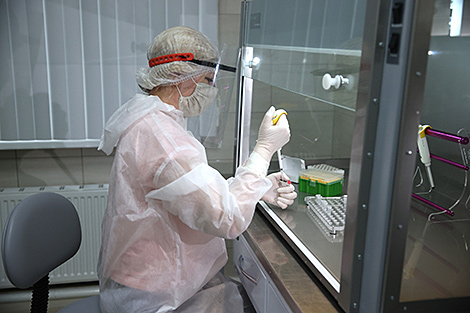Press releases
No new variants of SARS-CoV-2 reported in Belarus

An archive photo
MINSK, 4 February (BelTA) – No new variants of the SARS-CoV-2 virus have been detected in Belarus, BelTA learned from the press service of the Belarusian Healthcare Ministry.
“Taking into consideration that the viral mutation is a relentless and productive process, it is of crucial importance to be able to identify new variants as fast as possible. For this purpose, Belarus has developed a technique for sequencing the S gene of the virus, which is responsible for most of the mutations identified in the new variants of the virus (British, South American, Japanese). To date, Belarusian scientists have not found new variants of the virus in persons arriving in Belarus,” the press service said.
The National Research Center for Epidemiology and Microbiology has established an algorithm to track the spread of the new variants of the SARS-CoV-2 virus. It provides for the collection and examination of material from persons who have arrived in Belarus within the last 14 days and who have a positive PCR test result.
In December 2020, the new variant of coronavirus became the most common form of the virus in parts of England. The virus with the D614G mutation can spread more easily than the original one that started the pandemic. Its spread can have a significant impact on how the pandemic will evolve in the future. The D614G mutation is replacing the initial SARS-CoV-2 strain in the countries where it begins to circulate.
The virus detected in South Africa in December 2020 also has mutations similar to the British variant and is more infectious than the British one. It is most common in South Africa and Great Britain, followed by Germany, Australia, France, and Belgium by a large margin. The antibodies to the original variants of the virus are less effective at neutralizing the new variants and the new variants raise the specter that reinfections could be more likely, in particular in people with a compromised immune system, the press service said.
In January this year, Japanese researchers described a variant of the virus brought from Brazil. It turned out to be similar to the South African one in terms of the set of mutations. The mutations detected in Japan are similar to those of the South African variant.
There are separate reports of significant mutations in the genome of the virus identified in Germany (Bavaria) and Portugal.
Since the outbreak of the COVID-19 pandemic, the SARS-CoV-2 virus has been constantly evolving. Until May-June 2020, the genome changes were relatively insignificant, with an exception of the D614G mutation that quickly spread in Europe and the United States. The virus with such a mutation can invade host cells easier compared to the original variant detected in China in December 2019 - January 2020.







 print version
print version make home page
make home page add to bookmarks
add to bookmarks

